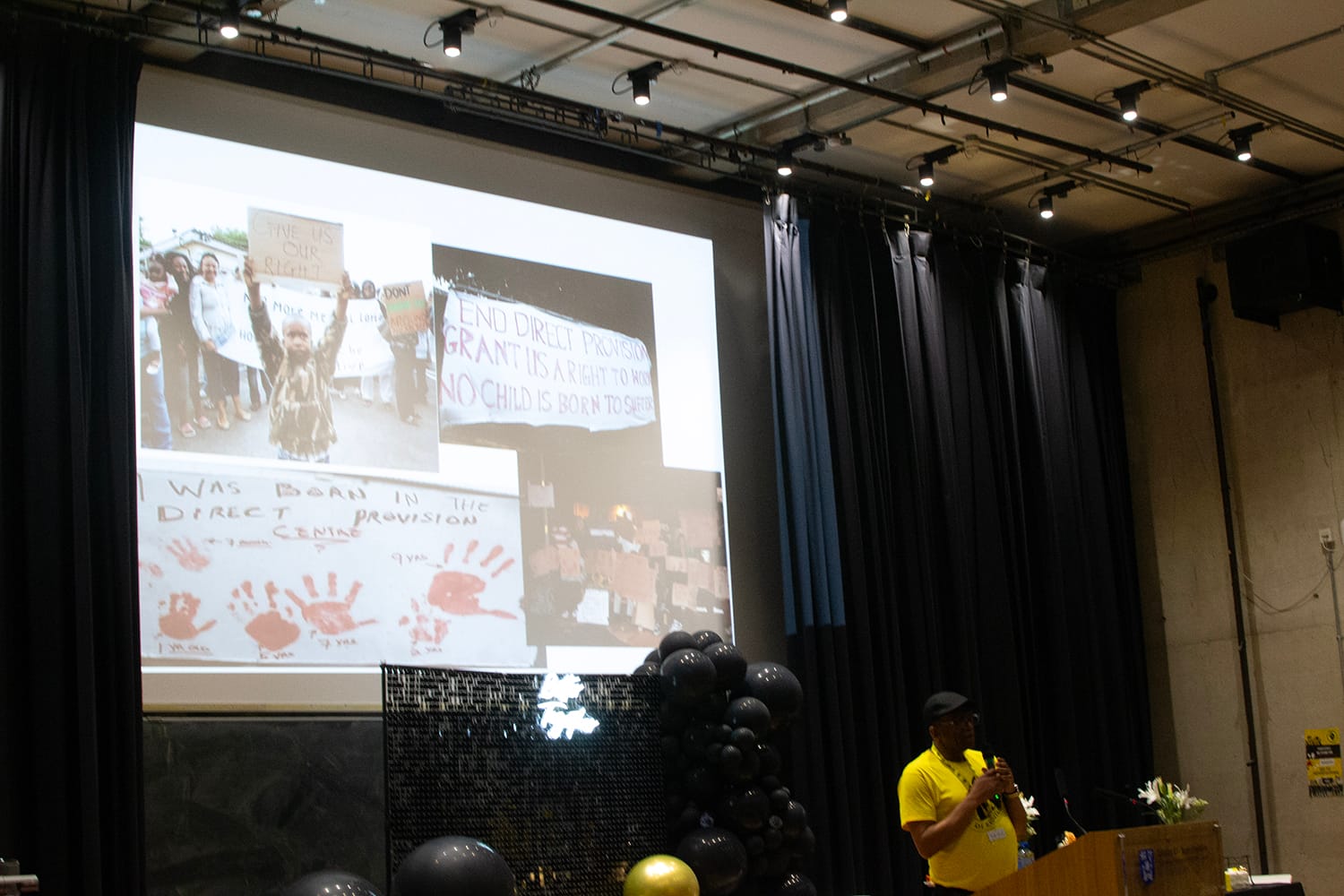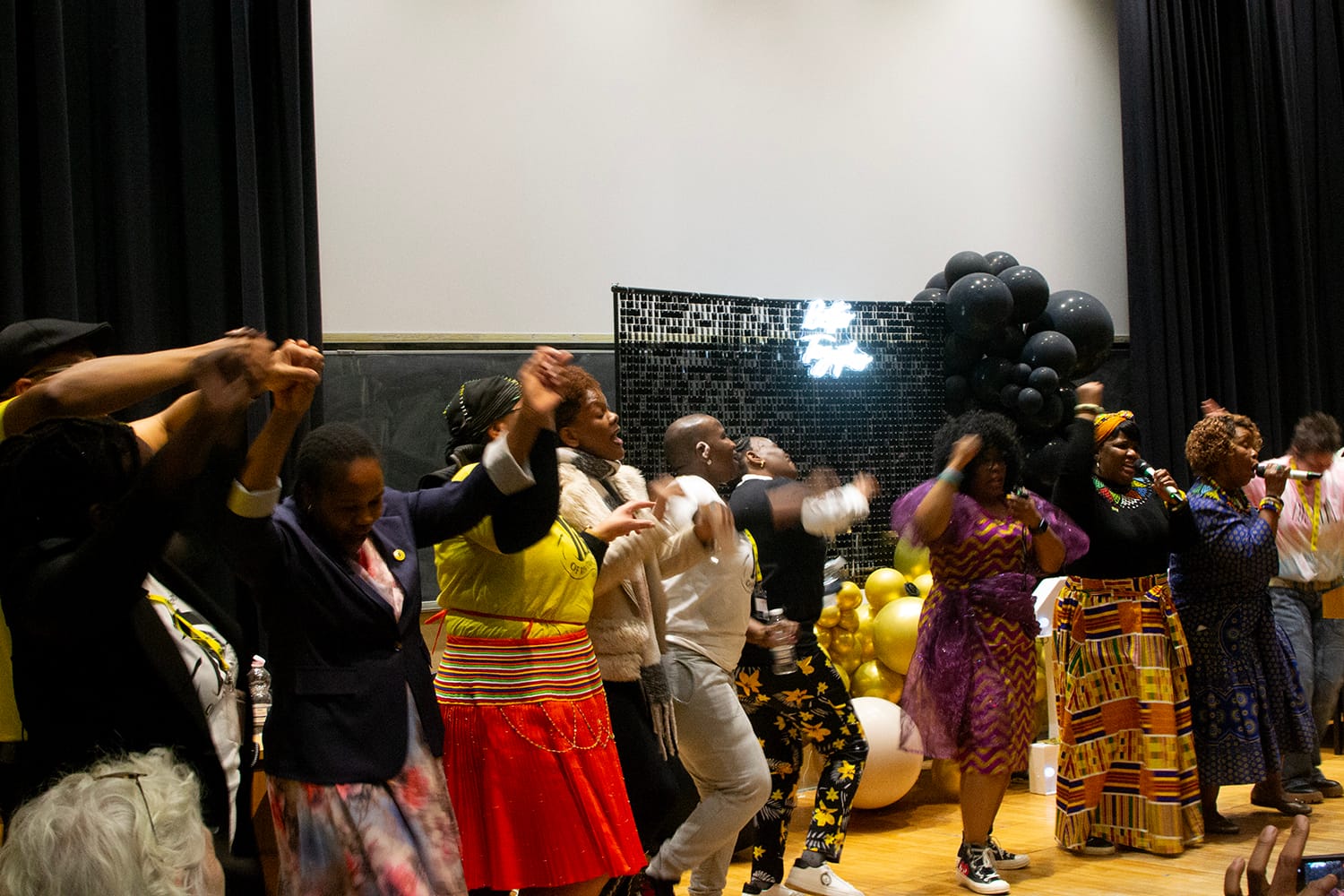What’s the best way to tell area residents about plans for a new asylum shelter nearby?
The government should tell communities directly about plans for new asylum shelters, some activists and politicians say.
“Amandla,” hollered Lucky Khambule when he reached the stage. “Ngawethu,” shouted the audience in reply.

Lucky Khambule jumps out of his seat to a wave of applause.
“Our father, our uncle, our brother,” says Sharon Mpofu from behind a podium, calling Khambule onto the stage.
White, black and golden balloons are strung along the stage. A neon sign says “Better Together”, near a glowy giant “1” and “0”.
Posters for the Movement of Asylum Seekers Ireland (MASI) dot the walls of Edmund Burke Theatre at Trinity College Dublin.
“WE STAND FOR JUSTICE, FREEDOM & DIGNITY” and “HEAR OUR CRY NO TO DEPORTATIONS,” they say.
Watching from the seats on Saturday were dozens of people, gathered to celebrate how 10 years ago, asylum seekers living in the Kinsale Road shelter in Co. Cork had taken a stand to protest their living conditions and mistreatment.
Their action worked, and they got what they wanted.
It also marked the beginning of MASI’s grassroots odyssey of empowering people seeking asylum to fight for their rights, help one another and speak for themselves.
“Nothing about us without us,” said a slide projected onto the screen.
“Amandla,” hollered Khambule when he reached the stage. “Ngawethu,” shouted the audience in reply.
That’s Zulu and Xhosa for “power is ours”.
Khambule, in a yellow t-shirt with MASI’s logo of a black clenched fist, recapped the movement’s origin story and the shared struggles of the past decade.
He retold the story of the first protest, with slides showing a younger Khambule on the balcony of the centre. He is wearing a blue tracksuit jacket, and a smile. The sun shines on his head.
Beside him, a man balances one baby in his arms, crouched down a little to hold another one’s hand at his feet, gazing low at the little one.
“We were being treated as less human beings,” said Khambule, “and we felt as residents at the time that it was about time to take this into our own hands.”

Another photo shows Khambule – alongside MASI members Bulelani Mfaco and Donnah Sibanda Vuma – testifying at an Oíreachtas committee about the living conditions of asylum shelters and the process of seeking sanctuary.
“It was important that we find our voice as people who are affected,” said Khambule.
MASI was formed “in the belief that we matter”, said Vuma later, during the event’s keynote speech.
The movement’s campaign for the right to work for people seeking asylum has brought change. After five months of filing an asylum claim, many can now apply for work permits.
As Khambule talks, a man’s “yessir” glides through the air.
Whenever someone introduced themselves as a MASI member, they said “and proudly so” right after it.
Towards the end of the event, Khambule again went onto the stage. He thanked volunteers without an asylum background who had helped them to push through over the years.
Nonprofits like the development and volunteer workers’ association Comhlámh, whose name MASI members still struggle to pronounce, said Khambule, laughing.
And the supportive lawyers, always willing to help them navigate legal jargon, he said, namechecking Wendy Lyon, Gary Daly and Stephen Kirwan.
Panels and talks informed people about their rights, and stories of shared hardships.
Niamh McDonald, director of the Hope and Courage Collective – an anti-extremism non-profit – offered tips on how to react when someone whips out their phone to record asylum seekers.
They can act all nice and polite and fish for information like, “How did you get here?” she said.
The trick is not to react at all, McDonald said. Don’t tell them anything.
She asked anti-racism activists not to re-share footage recorded by anti-immigration activists either: “What we feed, we fuel.”
Ezi Ejikeme, who used to be a lawyer in Nigeria, told the audience to fill their time while waiting on a work permit or a decision by enrolling in free courses and volunteering.
Don’t stare at the wall and get depressed, he said.
During a panel, a young Black woman with a long braided ponytail asked if there was any way she could partake in her college’s Erasmus programme, like others in her class, while still in the asylum process.
She couldn’t, said Vuma.
Three young women shared scraps of stories about growing up in direct provision centres.
Her family of five shared one room, said Tana Chady, who lived in an asylum shelter for most of her childhood.
She watched her mother’s life narrow, she said, her womanhood collapsing into a mothering role that she couldn’t escape.
“To be a woman for a minute,” Chady said.
Abdulai Mansaray had to turn down an offer to study law at Maynooth University, he said, unable to pay €14,000 in tuition fees while struggling to afford the basics.
“It was the lowest point in my entire life,” said Mansaray.
Other voices, too, spoke of how limited the right to third-level education is, and how limited the number of scholarships are through the University of Sanctuary scheme.
There were tales too about the struggles for shelter.
The guards or Dublin City Council workers often haul away their tents or ask them to move on, said Hasnain Khan, a homeless man seeking asylum.
“Tent life is the worst life,” he said. It’s cold and gruelling, and people tell them to “go back to your country”.
Sharon Mpofu, the event’s MC, talked about how difficult it was to move out of direct provision. She screened Daft like crazy, day and night. Couldn’t wait to get out, Mpofu said.
But landlords would ask for references. “DP [direct provision] was my only reference,” she said, which was a hard sell.
The place she’s renting now? She was the first to apply for it.
The estate agent was shocked by how quick she was. “He said, ‘I just posted this. How did you see it?’” said Mpofu, chuckling.
She is a member of the tenants union CATU now, said Mpofu, encouraging others to join too.

Later, Khambule and two other MASI members cut the cake and clinked glasses. They danced to the melodies of African Queens, a three-woman a cappella ensemble.
What makes MASI persevere is determination and a desire to achieve meaningful change, Khambule said.
“As long as that change is not happening, we will continue for the next 10 years,” he said.
Khambule stayed chatting to members, long after the celebration had officially ended. He was laughing.
Get our latest headlines in one of them, and recommendations for things to do in Dublin in the other.